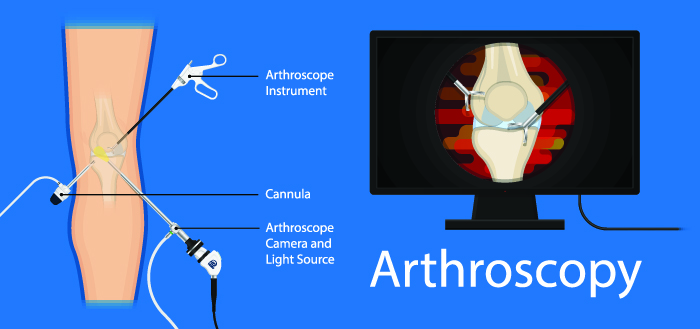Minimally Invasive Knee Replacement Surgery in Sadashiv Peth, Pune
Minimally invasive knee replacement surgery is an alternative method of knee replacement wherein a shorter incision is made, making it a less-invasive approach of exposing the knee joint, aiming for quicker recovery and less pain, post-operation.
What is Minimally Invasive Knee Replacement Surgery?
Minimally invasive knee replacement surgery is similar to traditional knee replacement surgery, except for less exposure and disturbance to surrounding tissues during surgery. In this procedure, the damaged or worn out surfaces of the knee joint are removed and replaced with a prosthesis, to reduce pain and regain mobility in the joint.

Why is Minimally Invasive Knee Replacement Surgery Done?
Minimally invasive knee replacement surgery may be required if there’s damage to the knee joint. It may occur due to various medical conditions, including –
- Osteoarthritis – The most common type of arthritis is called osteoarthritis. It is mostly associated with the wear and tear of cartilage due to age. As we grow old, the cartilage starts to wear away leading to bones rubbing against each other. This causes pain and stiffness in the knee joint.
- Osteonecrosis – In this condition, the blood supply to the thighbone or shinbone gets disrupted. This can lead to severe arthritis, and ultimately, destruction of the knee joint.
- Bone tumor in the knee joint – Sometimes, bone tumors such as osteosarcoma can develop in the thighbone or shinbone.
- Rheumatoid arthritis – This is an autoimmune condition wherein the synovial membrane becomes thick and inflamed, causing cartilage damage and ultimately, pain and stiffness in the knee joint.
- Fracture or injury of knee joint – Knee replacement surgery may be required in case of a severe fracture or injury to the knee joint.
How is Minimally Invasive Knee Replacement Surgery Done in Pune?
During minimally invasive knee replacement surgery, the patient is first administered general or spinal anesthesia. After this, the surgeon will make an incision over the middle portion of the knee. They will cut through the skin and tissue underneath. Then, the damaged surfaces will be removed from the shin and thigh bone. After this, the metal implants will be placed and cemented into the remaining bone. A part of the underside of the kneecap will also be removed, in most cases. For smooth movement, a plastic spacer will also be inserted in between the implants. Finally, the incision will be closed with stitches.
What Happens After Minimally Invasive Knee Replacement Surgery?
After minimally invasive knee replacement surgery, patients are kept in the observation room for a while. They will experience pain after the surgery, for which the doctor will prescribe pain medication. Most patients can go home within a day or two of their surgery. Patients are advised to avoid putting weight on their legs for a few weeks after their surgery. Their doctor will provide them instructions regarding movement. They may also have to use crutches or a cane for a few days or weeks after the surgery. Patients also need to undergo physical therapy to regain strength and range of function in their knee joint. Most patients can go back to their daily life within a few weeks after surgery.
What are the Complications Associated with Minimally Invasive Knee Replacement Surgery?
There are some complications associated with minimally invasive knee replacement surgery, including –
- Infection at the site of incision
- Blood clots
- Injury to nearby blood vessels, nerves, or other structures
- Bleeding
- Limited range of motion of the knee after surgery
- Implant becoming loose over time, requiring revision surgery
- Pain persisting even after surgery
When to See a Doctor Regarding Minimally Invasive Knee Replacement Surgery?
You should consider consulting your doctor regarding minimally invasive knee replacement surgery if –
- You are experiencing excruciating pain, that is interfering with your daily activities
- You have tried other non-surgical treatment options which have failed to relieve pain and inflammation
- You are an eligible candidate for minimally invasive knee replacement surgery
Request an appointment at Apollo Spectra, Pune
Call 1860-500-2244 to book an appointment
Conclusion
The outlook of minimally invasive knee replacement surgery is great. Most patients can find relief from pain and stiffness in the knee joint and return to their daily activities.
In most cases, the knee replacements last for 10 to 15 years after surgery. Patients can extend the life of their knee replacements by engaging in low-impact exercises regularly and taking the needful precautions.
For some individuals, minimally invasive knee replacement surgery may not be ideal. This includes –
- Individuals who are heavy-built or muscular
- Individuals who have severe knee instability
- Individuals with knee deformities
- Individuals requiring complex replacement
To prepare for minimally invasive knee replacement surgery, you should inform your doctor about any medications you are taking including prescription medication, OTC medications, street drugs, vitamins, herbs, or other supplements. Your doctor will advise you regarding which medication you need to stop taking a few weeks before the surgery. You should also avoid smoking as it slows down the healing process. You may also be advised to lose weight if you are overweight or obese. You are also required to avoid eating or drinking anything at least 6 to 12 hours before surgery.
Symptoms
Our Top Specialities
NOTICE BOARD
CONTACT US
CONTACT US
 Book Appointment
Book Appointment


.svg)
.svg)
.svg)
.svg)








